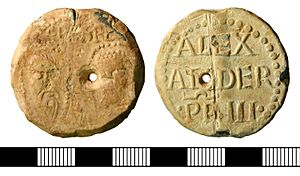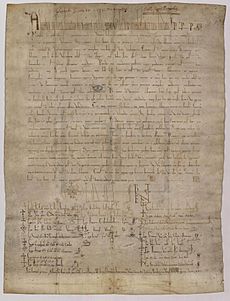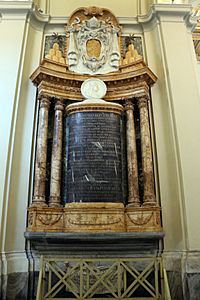Pope Alexander III facts for kids
Quick facts for kids Pope Alexander III |
|
|---|---|
| Bishop of Rome | |
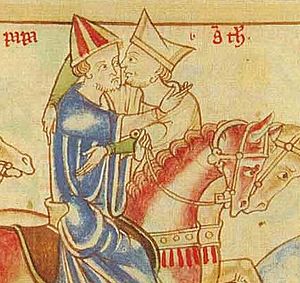
Alexander III bidding farewell to Thomas Becket (13th century miniature attributed to Matthew Paris, British Library)
|
|
| Church | Catholic Church |
| Papacy began | 7 September 1159 |
| Papacy ended | 30 August 1181 |
| Predecessor | Adrian IV |
| Successor | Lucius III |
| Orders | |
| Consecration | 20 September 1159 by Ubaldo Allucingoli |
| Created Cardinal | October 1150 |
| Personal details | |
| Birth name | Rolando |
| Born | c. 1100–05 Siena, Papal States |
| Died | 30 August 1181 Civita Castellana, Papal States |
| Previous post |
|
| Other Popes named Alexander | |
Pope Alexander III (born around 1100-1105 – died August 30, 1181) was originally named Roland. He was the leader of the Catholic Church and the ruler of the Papal States from September 7, 1159, until his death in 1181.
Born in Siena, Alexander became pope after a difficult election. He had to spend much of his time away from Rome. This was because several rivals, supported by the Holy Roman Emperor Frederick I Barbarossa, claimed to be the rightful pope. Alexander said no to an offer from the Byzantine Emperor Manuel I Komnenos to end the split between the Eastern and Western churches. He also approved the Northern Crusades and held an important meeting called the Third Council of the Lateran. The city of Alessandria in Piedmont is named after him.
Contents
Early Life and Career
Rolando was born in Siena. Some people from the 14th century said he was part of the noble Bandinelli family, but this has not been proven. He probably studied in Bologna, Italy, where he taught theology.
In October 1150, Pope Eugene III made him a Cardinal-Deacon. Later, he became a Cardinal-Priest of St Mark. In 1153, he became the pope's chancellor, a high-ranking official. He was a leader among the cardinals who did not agree with the German Emperor Frederick I Barbarossa. In 1156, he helped create the Treaty of Benevento. This agreement brought peace between Rome and the Kingdom of Sicily.
Disputed Election and Challenges
On September 7, 1159, Alexander III was chosen to become pope after Adrian IV died. However, a small group of cardinals chose another person, Cardinal Octavian. He called himself Victor IV and became the German Emperor's "antipope." An antipope is someone who claims to be the pope but is not recognized by the Church.
This situation was very serious for Alexander III. Many reports from that time said that the Emperor's antipope was supported by most kingdoms in Europe. Only Portugal, Sicily, Aragon, and Castile did not support him. However, in 1161, King Géza II of Hungary signed an agreement. He recognized Alexander III as the true pope. This helped Alexander gain more support. Soon, other kings, like the King of France and King Henry II of England, also recognized him.
Because the Emperor was very powerful in Italy, Alexander had to live outside Rome for much of his time as pope. When he heard that Victor IV had died in 1164, Alexander cried. He even told off the cardinals who were happy about the rival antipope's death.
The conflict between Alexander III and the antipopes (Victor IV, Paschal III, and Antipope Calixtus III) continued. These antipopes were supported by the German Emperor. The dispute finally ended after Frederick Barbarossa lost the Battle of Legnano in 1176. After this defeat, Barbarossa finally recognized Alexander III as the true pope in the Peace of Venice in 1177.
On March 12, 1178, Alexander III returned to Rome. He had been forced to leave the city twice before. The first time was between 1162 and 1165. He was arrested by supporters of the antipope but was freed and sent to safety. He left Rome again in 1167. He traveled to different safe places like Benevento and Anagni.
Key Actions as Pope
Spreading Christianity
Alexander III was the first pope to focus on missionary work east of the Baltic Sea. In 1164, he created the Archbishopric of Uppsala in Sweden. He also appointed a bishop named Fulco in Estonia. In 1171, Alexander was the first pope to address the situation of the Church in Finland.
In a special document called a papal bull, Non parum animus noster, in 1171 or 1172, he approved the ongoing Northern Crusades. These were military campaigns against non-Christians in northern Europe. He promised forgiveness of sins for those who fought there. This decision made it acceptable to use forced conversion as a method during these battles.
Dealing with Empires
In 1166, Alexander received a message from the Byzantine emperor Manuel I. The emperor offered to end the Great Schism (the split between the Eastern and Western churches). In return, Alexander would have to recognize Manuel as emperor. Manuel also offered to help the pope regain power in Italy. Alexander gave a vague answer. In 1168, he completely rejected the same offer from another Byzantine group. He said it was too difficult. He seemed worried that the Byzantine Empire would control Italy if the pope relied on their help.
Besides dealing with Emperor Barbarossa, Alexander also challenged King Henry II of England. This was because of the murder of Thomas Becket in 1170. Alexander was very close to Becket. He later made Becket a saint in 1173. This was the second English saint Alexander had made, the first being Edward the Confessor in 1161. However, Alexander did confirm Henry's position as Lord of Ireland in 1172.
On May 23, 1179, Alexander issued another important papal bull called Manifestis Probatum. In this document, he recognized the right of Afonso I to call himself King of Portugal. This was a very important step for Portugal to become a recognized independent kingdom. Afonso had been using the title of king since 1139.
Church Reforms
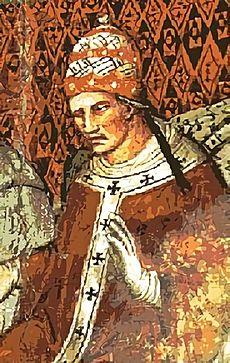
Even when he was a fugitive, Alexander had the support of Louis VII of France.
In 1163, Alexander called together religious leaders from England, France, Italy, and Spain for the Council of Tours. They discussed issues like the unfair distribution of church money, lending money with very high interest rates by clergy, and non-church people owning church taxes.
In March 1179, Alexander III held the Third Council of the Lateran. This was one of the most important church councils of the Middle Ages. During this council, several of Alexander's ideas for improving the Church were put into law. One important rule was that no one could be elected pope without two-thirds of the cardinals' votes. This rule was changed slightly in 1996 but was brought back in 2007. The period from 1177, when Emperor Frederick and the antipope Calixtus III gave up, until this council, was the peak of Alexander III's power.
However, soon after the council, the people of Rome forced Alexander III to leave the city. He never returned. On September 29, 1179, some nobles set up another antipope, Antipope Innocent III. But Alexander III used money wisely and gained control over him. So, Innocent III was removed from his position in January 1180. In 1181, Alexander III excommunicated King William I of Scotland. This meant William was removed from the Church. Alexander also put Scotland under an interdict, which stopped many church services there.
Church Leadership
During his time as pope, Alexander III appointed 68 new cardinals. These included two future popes, Urban III and Clement III. He also made one of his cardinals, Galdino della Sala, a saint.
Alexander III did not beatify anyone during his papacy. However, he did make ten people saints. These included important figures like Bernard of Clairvaux and Thomas Becket.
Death
Pope Alexander III died in Civita Castellana on August 30, 1181. He had been pope for almost twenty-two years. This was the longest time anyone had been pope since Pope Adrian I in the 8th century.
See also
 In Spanish: Alejandro III (papa) para niños
In Spanish: Alejandro III (papa) para niños
- List of popes
- Cardinals created by Alexander III
 | Sharif Bey |
 | Hale Woodruff |
 | Richmond Barthé |
 | Purvis Young |


